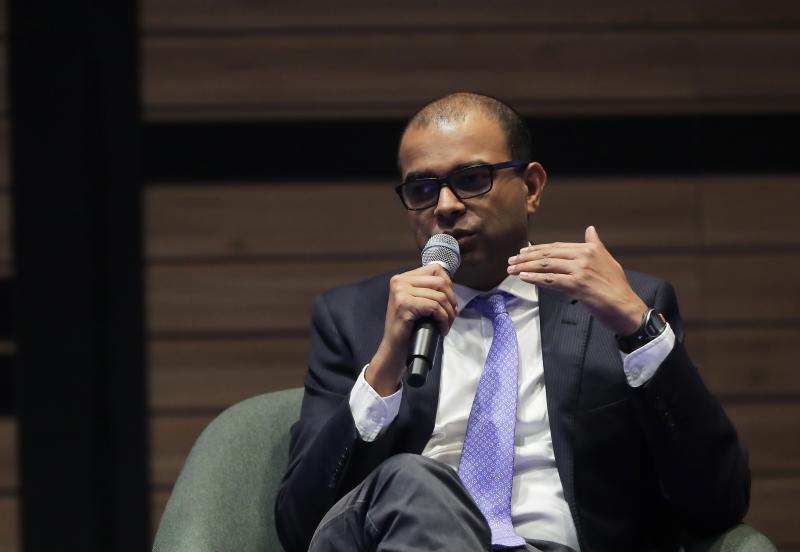Laws on fake news should not constrain media outlets' ability to operate: Conference panel
Sign up now: Get ST's newsletters delivered to your inbox

Senior Minister of State for Communications and Information Janil Puthucheary said that members of the Select Committee on Deliberate Online Falsehoods all agree that the challenge of fake news has to be tackled on multiple fronts, and involve a range of people, from educators to the mainstream media.
ST PHOTO: KELVIN CHNG
Nur Asyiqin Mohamad Salleh
Follow topic:
SINGAPORE - A parliamentary committee studying ways to fight fake news wants to strike the right balance between ensuring room for free expression for journalists and others on the one hand, and having legal and other tools to tackle disinformation on the other.
The Select Committee on Deliberate Online Falsehoods, which held public hearings over eight days in March, is still mulling over recommendations to ensure its eventual report addresses the views and concerns of stakeholders involved, Senior Minister of State for Communications and Information Janil Puthucheary said on Monday (June 25).
"Our key intent is to preserve as much as possible the opportunity for the type of discourse we feel is really very important for the resilience of our society," he said at a panel discussion on fighting fake news at the opening of the East-West Centre's international media conference titled What Is News Now?
"We are sharpening and shaping our response to make sure we hit the right point where it remains possible for people to come into the space and generate new products; it remains possible for journalists to engage in their profession with an increasing degree of seriousness and confidence that their platforms will be trusted; that there is room for disagreement, satire, comedy and commentary," said Dr Janil.
"We want to get the right blending point on this, so that's why we're taking our time," he added.
The Select Committee's report, which will be presented to Parliament for debate, will be out later this year, Dr Janil told reporters after the session at the Singapore Management University School of Law. The session was moderated by Mr Torben Stephan of German think-tank Konrad Adenauer Stiftung, which also co-hosted the conference.
Panellists had raised concerns that fake news laws, while aimed at tackling misinformation used to sow discord and hatred online, should not have a crippling effect on the press, political opponents and civil society. They also said the definition of fake news had to be thought through and consider factors like intent and reach.
"It's important that we get a handle on the meaning of fake news," said Mr Warren Fernandez, editor-in-chief of Singapore Press Holdings' English/Malay/Tamil Media Group.
While there might be gaps in existing legislation, any new laws introduced should be targeted at holding content distributors responsible for the content they spread. "A significant and legitimate concern is that if the proposed law is too broad and sweeping, it might constrain the ability of news organisations to operate," said Mr Fernandez, who is also the editor of The Straits Times.
Hong Kong Baptist University media professor Cherian George said laws should be narrowly tailored and carry penalties proportionate to the expected harm, and suggested that they should apply to governments as well.
"Any serious discussion about disinformation must put front and centre the concerns about the state itself as a source of disinformation," he said.
"It should be incumbent on the press, citizens and MPs to scrutinise any legislation with extreme care because of the possibility that any such law will essentially be used against opponents of the state."
Facebook's head of public policy for Asean, Malaysia and Singapore, Mr Alvin Tan, said legislation was an "imperfect tool" to deal with the issue of fake news.
Dr Janil said the committee had received 170 written submissions before public hearings and heard evidence from 65 speakers, and added that more people wrote in after these ended.
Its members all agree that the challenge of fake news has to be tackled on multiple fronts, and involve a range of people, from educators to the mainstream media. They also acknowledge that the current state of affairs - in regulation, education, and legislation - is not enough, he added.
"We've made it quite clear... that if there is going to be legislation, we want to make sure we get the legislation correct in terms of its scope, its intent, its powers," he said.
The Select Committee, he added, has said the steps it will take - whether legislation is involved or not - will be concentrated on the "egregious end of the spectrum, where there are very real world effects on a handful of domains that we feel are particularly pertinent to our society".
"We have for a long time had issues around race, religion and language. We will continue to hold this stance," he said. "But we may have to consider issues of national security and defence as the space has become weaponised over time."
Challenges to press freedom were also discussed at other sessions on Monday, as were covering religion in sensitive and nuanced ways, and deepening the conversation on sexual harassment and gender discrimination highlighted by the #metoo movement.
Tuesday's sessions will look at the changing geopolitics of the region, as well as issues such as whether a United States-China trade war can be averted.

